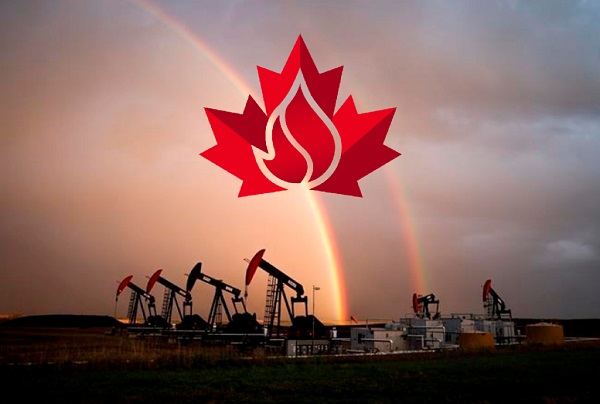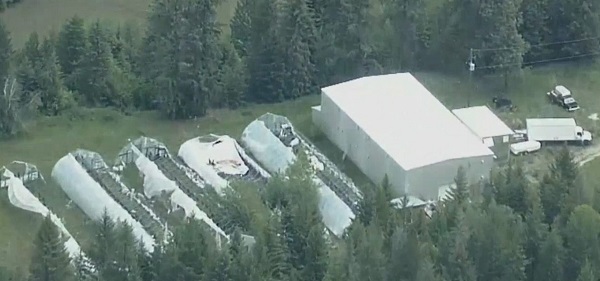Economy
Trump’s Wakeup Call to Canada – Oil & Gas is Critical to our Economy

From EnergyNow.Ca
By Jim Warren
On the bright side, at least President Donald Trump’s threat to impose 25% tariffs on Canadian oil and gas, might have alerted some Central Canadians to the critical importance of oil and gas to the national economy. Trump’s tariff pronouncements may also have forced the Laurentian Elite to rethink the wisdom of allowing anarchy to reign in our immigration system and border management.
Any nation hoping to be a serious player in the areas of international trade and diplomacy needs to meet several critical criteria. Without them a country can have difficulty marketing its goods and services to the world and in retaining meaningful economic and political sovereignty. One of the key criteria is for a country to have a good measure of control over its borders. But there are other elements critical to having effective sovereignty and independence. Having access to versatile, readily transportable energy commodities like oil and gas is one of those essentials. Accordingly, oil and gas are considered strategically important industries.
Lacking any of the major building blocks of strategic economic sovereignty, like the steel and aluminum industries and a thriving manufacturing sector, as well as highly developed transportation sector and the energy industries needed to support all the other sectors can leave a country vulnerable to domination by others. The vulnerabilities can lead to economic and political crises for a country during trade wars, international disputes leading to trade sanctions and embargoes, shooting wars and big natural disasters. A lack of strong trade and military alliances can make matters even worse.
It’s not like there wasn’t a mountain of evidence underlining the strategic importance of oil and gas in the last few years. How smart was it for Angela Merkel to allow Russia, a state run by a psychopath and his team of criminal oligarchs, to control a major portion of its energy supplies? The Ukraine gets it. After its war with Russia began, the Ukrainian government allowed Russian gas to be piped across its territory to Eastern Europe for nearly two years. This was because they realized messing with a commodity critical to bordering states such as Hungary, Slovakia and Romania was politically hazardous.
It is true that a country can still have a thriving economy even if it is missing one or two items from the basket of strategically important industries. Singapore, for example, needs to import fossil fuel but is still considered one of Southeast Asia’s economic tigers. But this is only possible because Singapore is so good at most everything else. It has several other economic engines that perform exceptionally well.
Looking back several decades reminds us that Japan risked entering a World War to obtain the petroleum they needed. To get it, the Japanese concluded they needed to conquer parts of Indonesia. (Similarly they wanted Southeast Asia for its rubber.) They knew these were actions the US wouldn’t tolerate, but they decided they had to do them anyway.
While we’re on the topic of World War II, it is instructive to recall Hitler fought it with one hand tied behind his back. Germany had no oil of its own and gasoline refined from coal and the oil available from their Romanian ally were never enough. That’s why the German’s placed such great hopes in capturing Russia’s Caspian oil fields in 1943. Similarly, Hitler invaded Norway to ensure access to Swedish iron ore—another strategic commodity Germany lacked.
Canada’s oil revenues along with the taxes and royalties collected from those revenues are derived almost entirely from the oil we export to the US. Our export revenues for 2022, following the worst of the covid years, were $123 billion. They accounted for 15.8% of all Canada’s exports and 6.6% of GDP. The following year saw exceptionally high oil prices globally. That year the value of oil Canada’s oil production hit $139 billion and accounted for 7.1% of GDP. Pull even half of those revenues out of the Canadian economy for very long and we’re in economic depression territory.
So, thanks for the wakeup call president Trump. The fact Trump has indicated he will postpone his final decision until February 1, is of some comfort. Danielle Smith has met with him at Mar-a-Lago to make the case against tariffs on Canadian crude. Smith is among the most knowledgeable and capable people there are when it comes to oil and gas production and trade. We couldn’t hope for a better advocate for the producing provinces. She’s certainly a cut above Justin Trudeau and anyone else in his cabinet. Let’s hope Smith she managed to convince Trump how imposing tariffs would harm the economies of both countries.
There is an obvious way to prevent being in this sort of situation in the future – diversify our export opportunities by building more pipelines to tidewater. In my last column I focused on the difficulties involved in getting a pipeline built to the Atlantic coast. The challenges identified focused on the barriers thrown up by Quebec’s politicians and environmentalists. Trump’s ongoing tariff pronouncements suggest it would be in Canada’s national strategic interest to use whatever legal measures are required to sweep those barriers aside in both Quebec and British Columbia to get new tidewater pipelines built.
There is plenty the federal government can do to override the demands of municipalities, special interest groups and provincial governments in support of high national purposes and in emergencies. Section 91 of the constitution gives parliament broad, albeit somewhat vague, powers to do what needs to be done “to make laws for the peace, order and good government of Canada” in all matters not exclusively the jurisdiction of the provinces. And, you would think that if the heavy hand of the Emergencies Act can be used to prevent horn honking and traffic snarls in Ottawa, it could be employed to prevent the environmentally sanctimonious from blocking projects critical to our economic and political sovereignty. Of course doing any of this will require voting the Liberals out of office.
Sorry premier Ford, retaliatory tariffs and export taxes can’t be the only tools employed; especially when they cause self-inflicted wounds. Unfortunately, until we have more export opportunities for oil and gas we may need to limit our counter attacks on Americans to misleading travel directions and poor restaurant service.
Alberta
Alberta’s grand bargain with Canada includes a new pipeline to Prince Rupert

From Resource Now
Alberta renews call for West Coast oil pipeline amid shifting federal, geopolitical dynamics.
Just six months ago, talk of resurrecting some version of the Northern Gateway pipeline would have been unthinkable. But with the election of Donald Trump in the U.S. and Mark Carney in Canada, it’s now thinkable.
In fact, Alberta Premier Danielle Smith seems to be making Northern Gateway 2.0 a top priority and a condition for Alberta staying within the Canadian confederation and supporting Mark Carney’s vision of making Canada an Energy superpower. Thanks to Donald Trump threatening Canadian sovereignty and its economy, there has been a noticeable zeitgeist shift in Canada. There is growing support for the idea of leveraging Canada’s natural resources and diversifying export markets to make it less vulnerable to an unpredictable southern neighbour.
“I think the world has changed dramatically since Donald Trump got elected in November,” Smith said at a keynote address Wednesday at the Global Energy Show Canada in Calgary. “I think that’s changed the national conversation.” Smith said she has been encouraged by the tack Carney has taken since being elected Prime Minister, and hopes to see real action from Ottawa in the coming months to address what Smith said is serious encumbrances to Alberta’s oil sector, including Bill C-69, an oil and gas emissions cap and a West Coast tanker oil ban. “I’m going to give him some time to work with us and I’m going to be optimistic,” Smith said. Removing the West Coast moratorium on oil tankers would be the first step needed to building a new oil pipeline line from Alberta to Prince Rupert. “We cannot build a pipeline to the west coast if there is a tanker ban,” Smith said. The next step would be getting First Nations on board. “Indigenous peoples have been shut out of the energy economy for generations, and we are now putting them at the heart of it,” Smith said.
Alberta currently produces about 4.3 million barrels of oil per day. Had the Northern Gateway, Keystone XL and Energy East pipelines been built, Alberta could now be producing and exporting an additional 2.5 million barrels of oil per day. The original Northern Gateway Pipeline — killed outright by the Justin Trudeau government — would have terminated in Kitimat. Smith is now talking about a pipeline that would terminate in Prince Rupert. This may obviate some of the concerns that Kitimat posed with oil tankers negotiating Douglas Channel, and their potential impacts on the marine environment.
One of the biggest hurdles to a pipeline to Prince Rupert may be B.C. Premier David Eby. The B.C. NDP government has a history of opposing oil pipelines with tooth and nail. Asked in a fireside chat by Peter Mansbridge how she would get around the B.C. problem, Smith confidently said: “I’ll convince David Eby.”
“I’m sensitive to the issues that were raised before,” she added. One of those concerns was emissions. But the Alberta government and oil industry has struck a grand bargain with Ottawa: pipelines for emissions abatement through carbon capture and storage.
The industry and government propose multi-billion investments in CCUS. The Pathways Alliance project alone represents an investment of $10 to $20 billion. Smith noted that there is no economic value in pumping CO2 underground. It only becomes economically viable if the tradeoff is greater production and export capacity for Alberta oil. “If you couple it with a million-barrel-per-day pipeline, well that allows you $20 billion worth of revenue year after year,” she said. “All of a sudden a $20 billion cost to have to decarbonize, it looks a lot more attractive when you have a new source of revenue.” When asked about the Prince Rupert pipeline proposal, Eby has responded that there is currently no proponent, and that it is therefore a bridge to cross when there is actually a proposal. “I think what I’ve heard Premier Eby say is that there is no project and no proponent,” Smith said. “Well, that’s my job. There will be soon. “We’re working very hard on being able to get industry players to realize this time may be different.” “We’re working on getting a proponent and route.”
At a number of sessions during the conference, Mansbridge has repeatedly asked speakers about the Alberta secession movement, and whether it might scare off investment capital. Alberta has been using the threat of secession as a threat if Ottawa does not address some of the province’s long-standing grievances. Smith said she hopes Carney takes it seriously. “I hope the prime minister doesn’t want to test it,” Smith said during a scrum with reporters. “I take it seriously. I have never seen separatist sentiment be as high as it is now. “I’ve also seen it dissipate when Ottawa addresses the concerns Alberta has.” She added that, if Carney wants a true nation-building project to fast-track, she can’t think of a better one than a new West Coast pipeline. “I can’t imagine that there will be another project on the national list that will generate as much revenue, as much GDP, as many high paying jobs as a bitumen pipeline to the coast.”
Business
Carney’s European pivot could quietly reshape Canada’s sovereignty

This article supplied by Troy Media.
Canadians must consider how closer EU ties could erode national control and economic sovereignty
As Prime Minister Mark Carney attempts to deepen Canada’s relationship with the European Union and other supranational institutions, Canadians should be asking a hard question: how much of our national independence are we prepared to give away? If you want a glimpse of what happens when a country loses control over its currency, trade and democratic accountability, you need only look to Bulgaria.
On June 8, 2025, thousands of Bulgarians took to the streets in front of the country’s National Bank. Their message was clear: they want to keep the lev and stop the forced adoption of the euro, scheduled for Jan. 1, 2026.
Bulgaria, a southeastern European country and EU member since 2007, is preparing to join the eurozone—a bloc of 20 countries that share the euro as a common currency. The move would bind Bulgaria to the economic decisions of the European Central Bank, replacing its national currency with one managed from Brussels and Frankfurt.
The protest movement is a vivid example of the tensions that arise when national identity collides with centralized policy-making. It was organized by Vazrazdane, a nationalist, eurosceptic political party that has gained support by opposing what it sees as the erosion of Bulgarian sovereignty through European integration. Similar demonstrations took place in cities across the country.
At the heart of the unrest is a call for democratic accountability. Vazrazdane leader Konstantin Kostadinov appealed directly to EU leaders, arguing that Bulgarians should not be forced into the eurozone without a public vote. He noted that in Italy, referendums on the euro were allowed with support from less than one per cent of citizens, while in Bulgaria, more than 10 per cent calling for a referendum have been ignored.
Protesters warned that abandoning the lev without a public vote would amount to a betrayal of democracy. “If there is no lev, there is no Bulgaria,” some chanted. For them, the lev is not just a currency: it is a symbol of national independence.
Their fears are not unfounded. Across the eurozone, several countries have experienced higher prices and reduced purchasing power after adopting the euro. The loss of domestic control over monetary policy has led to economic decisions being dictated from afar. Inflation, declining living standards and external dependency are real concerns.
Canada is not Bulgaria. But it is not immune to the same dynamics. Through trade agreements, regulatory convergence and global commitments, Canada has already surrendered meaningful control over its economy and borders. Canadians rarely debate these trade-offs publicly, and almost never vote on them directly.
Carney, a former central banker with deep ties to global finance, has made clear his intention to align more closely with the European Union on economic and security matters. While partnership is not inherently wrong, it must come with strong democratic oversight. Canadians should not allow fundamental shifts in sovereignty to be handed off quietly to international bodies or technocratic elites.
What’s happening in Bulgaria is not just about the euro—it’s about a people demanding the right to chart their own course. Canadians should take note. Sovereignty is not lost in one dramatic act. It erodes incrementally: through treaties we don’t read, agreements we don’t question, and decisions made without our consent.
If democracy and national control still matter to Canadians, they would do well to pay attention.
Isidoros Karderinis was born in Athens, Greece. He is a journalist, foreign press correspondent, economist, novelist and poet. He is accredited by the Greek Ministry of Foreign Affairs as a foreign press correspondent and has built a distinguished career in journalism and literature.
Troy Media empowers Canadian community news outlets by providing independent, insightful analysis and commentary. Our mission is to support local media in helping Canadians stay informed and engaged by delivering reliable content that strengthens community connections and deepens understanding across the country.
-

 Business18 hours ago
Business18 hours agoCarney’s European pivot could quietly reshape Canada’s sovereignty
-

 Crime1 day ago
Crime1 day agoManhunt on for suspect in shooting deaths of Minnesota House speaker, husband
-

 Alberta18 hours ago
Alberta18 hours agoAlberta’s grand bargain with Canada includes a new pipeline to Prince Rupert
-

 conflict3 hours ago
conflict3 hours ago“Evacuate”: Netanyahu Warns Tehran as Israel Expands Strikes on Iran’s Military Command
-

 Energy3 hours ago
Energy3 hours agoCould the G7 Summit in Alberta be a historic moment for Canadian energy?
-

 Bruce Dowbiggin2 hours ago
Bruce Dowbiggin2 hours agoWOKE NBA Stars Seems Natural For CDN Advertisers. Why Won’t They Bite?
-

 Crime2 hours ago
Crime2 hours agoMinnesota shooter arrested after 48-hour manhunt







